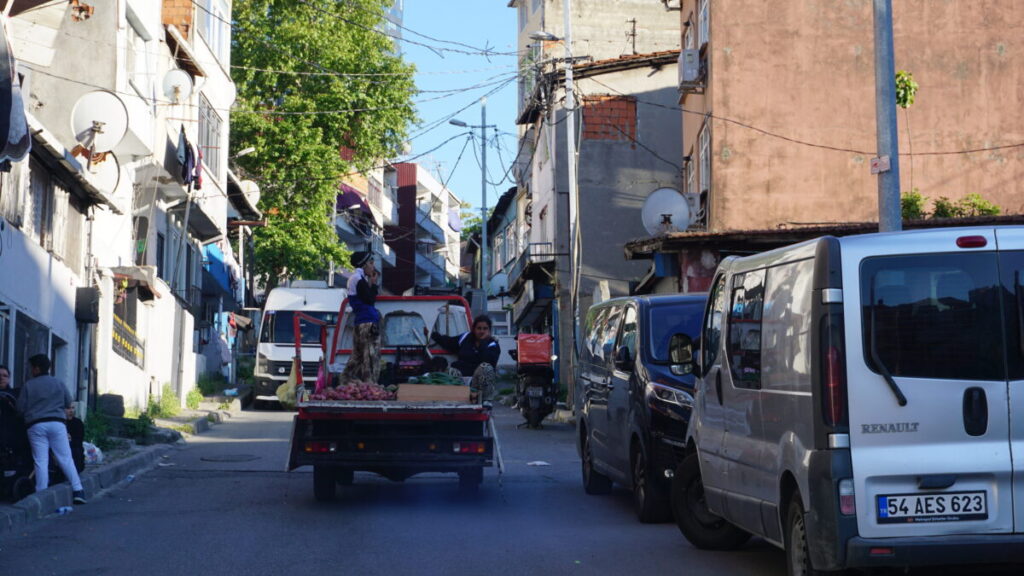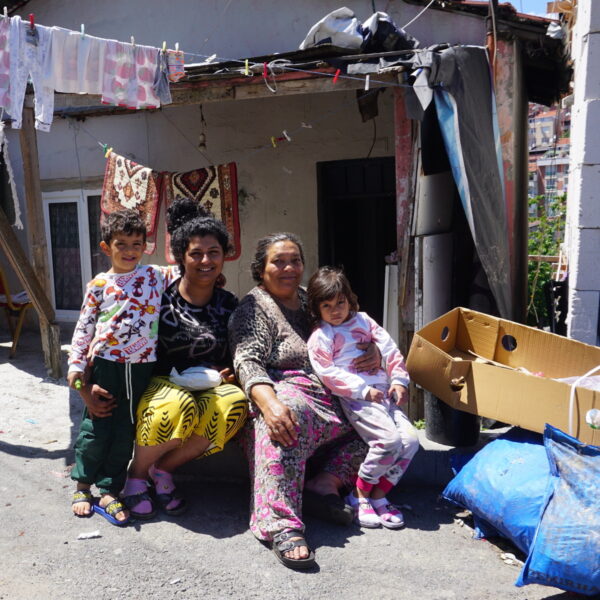In Kuştepe, a Romani neighborhood in Istanbul known for its close-knit community and lively street life, residents await a radical transformation with mixed feelings. The municipality promises new housing and a healthier environment as part of a major urban renewal project. Yet behind the official rhetoric, many fear it might mask a forced eviction. Caught between hope for a better future and the fear of losing their roots, residents wonder: who will truly benefit from this change?
Stepping off the metrobus and crossing an overpass near the Trump Towers, the city skyline reveals a sharp contrast: gleaming skyscrapers tower above modest two-story homes. Moving closer to the center, single-story houses give way to clusters of tiny one-room dwellings and aging buildings crowding narrow streets, some bordered by abandoned lots. The neighborhood feels caught between resilience and neglect.
At dawn, life stirs gently: children play in garden-like plots, women hang laundry, older women sit on stools by the roadside having breakfast, while men gather leisurely at doorways. Paper collection carts, piles of scattered trash, and a rusted, unused hand-cranked street swing tell another story—that of a neglected slum abandoned by authorities. Descending labyrinthine stairways, the sheer number of small homes becomes overwhelming. Residents go about their daily routines as water flows down the streets and cats roam freely. A young flower seller offers me a rose; teenagers stroll by; music drifts out of open windows. On my way back up, I narrowly avoid wastewater pouring from above. Am I inside or outside the city? This question lingers in the air for residents as well.
Urban Transformation: Promise or Threat?
Kuştepe’s urban transformation has been discussed for decades but remains fraught with challenges. Established in the 1950s when Roma families were relocated from Zincirlikuyu by the state, the neighborhood has long struggled with poverty, deteriorating housing, and failing infrastructure despite its central location.
Recent promises by the Şişli district municipality of “on-site” redevelopment have raised hopes for better living conditions without eviction. Yet memories of mass displacement from Sulukule* and the soulless towers of Fikirtepe cast a long shadow.
Asya Ağaçyaran, 28, a longtime resident and mother of three, lives in a one-room house she has repaired herself. “I’m a tenant. Most houses here don’t have title deeds — they were built a long time ago. I can’t afford rent anywhere else. If we get evicted, I’ll go to my mother’s house if she’s still there. Otherwise, I have nowhere to go,” she says.
Others hold onto hope. Saliha Portakal, 57, shares, “Urban renewal would be good. We’d finally have a separate bathroom, a real bedroom.” Yıldız, 65, a flower seller, adds, “At least we’d move into a clean house.” Another resident dreams aloud, “The children would have their own rooms.” A group of elders calls out, “Take the photo, sister, go ahead. Come see these shameful conditions.”
Okan Kemancı, a theater actor and dramaturgy teacher raised in Kuştepe, highlights the neighborhood’s enduring spirit. “Neighbors still help each other. Children play freely in the streets, inventing games with chalk and cushions. This environment fuels creativity. Kuştepe must not become another Fikirtepe.”
A Community Divided by Uncertainty
While many residents support on-site redevelopment, land ownership remains a thorny issue. Some hold title deeds or allocation certificates; many do not. A large number are tenants. How these varied legal statuses will be handled remains unclear.
Kemancı laments, “I’m about to become a victim of urban transformation. My house doesn’t have a title allocation certificate. Not everyone here has one. It’s a complicated issue. Inevitably, some people will be wronged.”
Elmas Arus, president of the Zero Discrimination Association and a Romani activist, warns, “Even having a deed isn’t enough when it’s divided among 15 family members. Many are in debt; some could end up with nothing. The transformation must be planned carefully with the Romani community to avoid harm and create value, including job opportunities.”
The neighborhood’s mukhtar (local representative) points to another challenge: Kuştepe is divided. One area is allowed to develop; the other is not. The neighborhood was once classified as “at risk” due to slums, but that status has changed. The land is owned by several public entities — the Şişli district municipality, Greater Istanbul Municipality, and the state. Some residents have property titles; others do not. “We want a renovation that doesn’t evict anyone or push people into debt. Tenants must have rights too,” he stresses.
Finally, the Kuştepe renovation project was halted after the arrest of the Şişli mayor in March 2025, along with Ekrem İmamoğlu and other CHP officials, and the appointment of a government administrator—once again leaving residents in uncertainty.
* Another historic Roma neighborhood in Istanbul, razed in 2008, whose residents faced forced displacement to the outskirts of the city

Photo of the Day: “Take the photo, sister, go ahead. Come and bear witness to these shameful conditions.” © Tuğba Öcek
